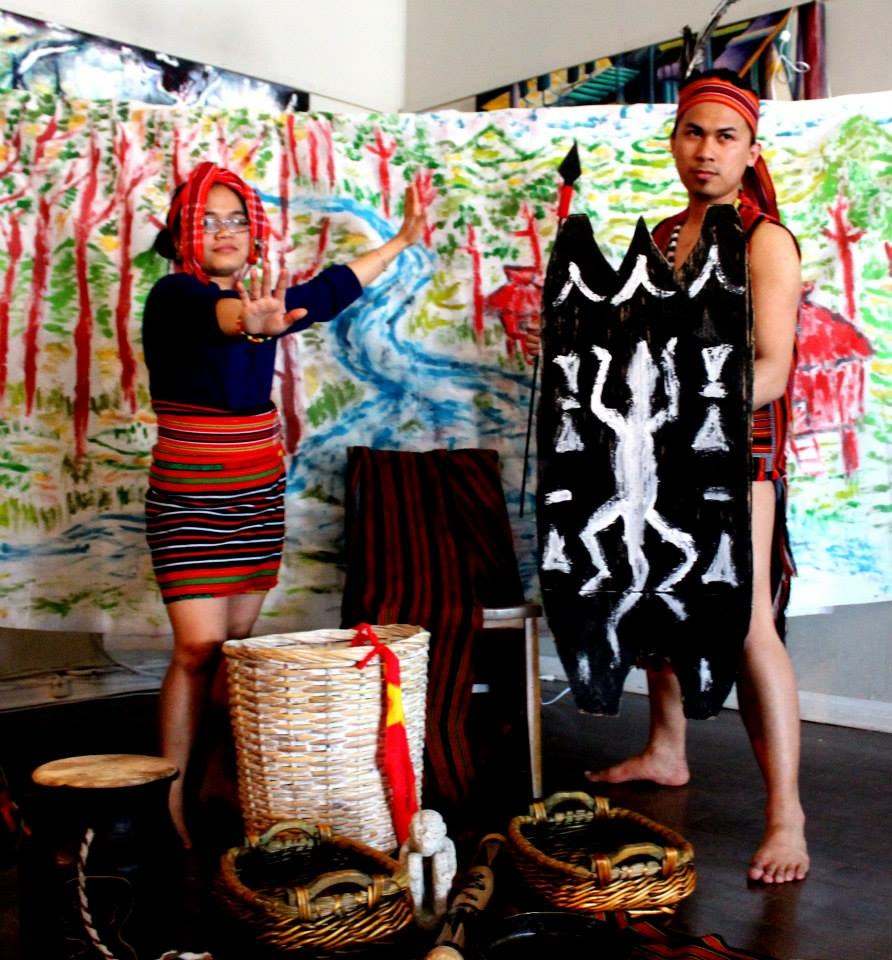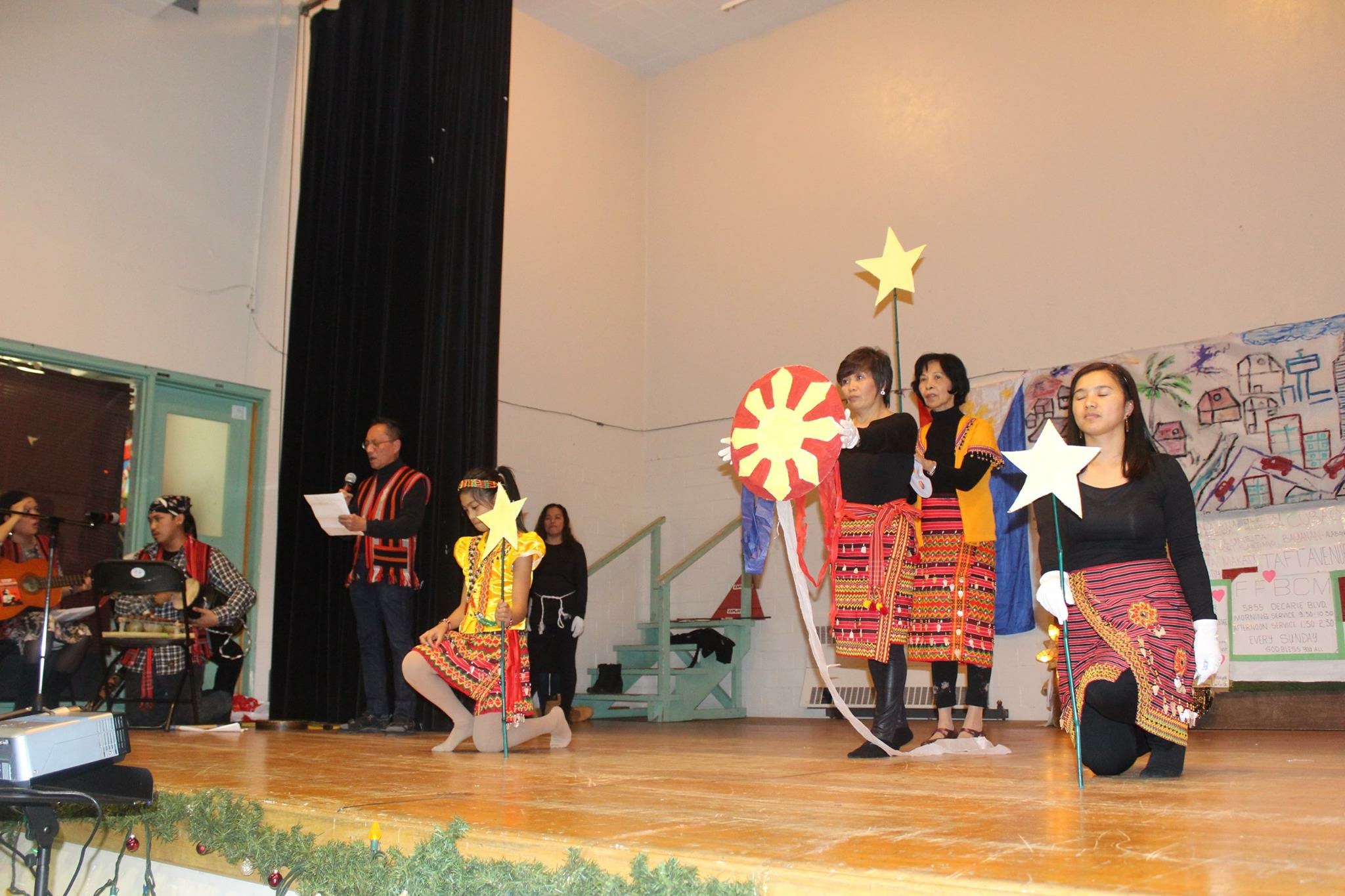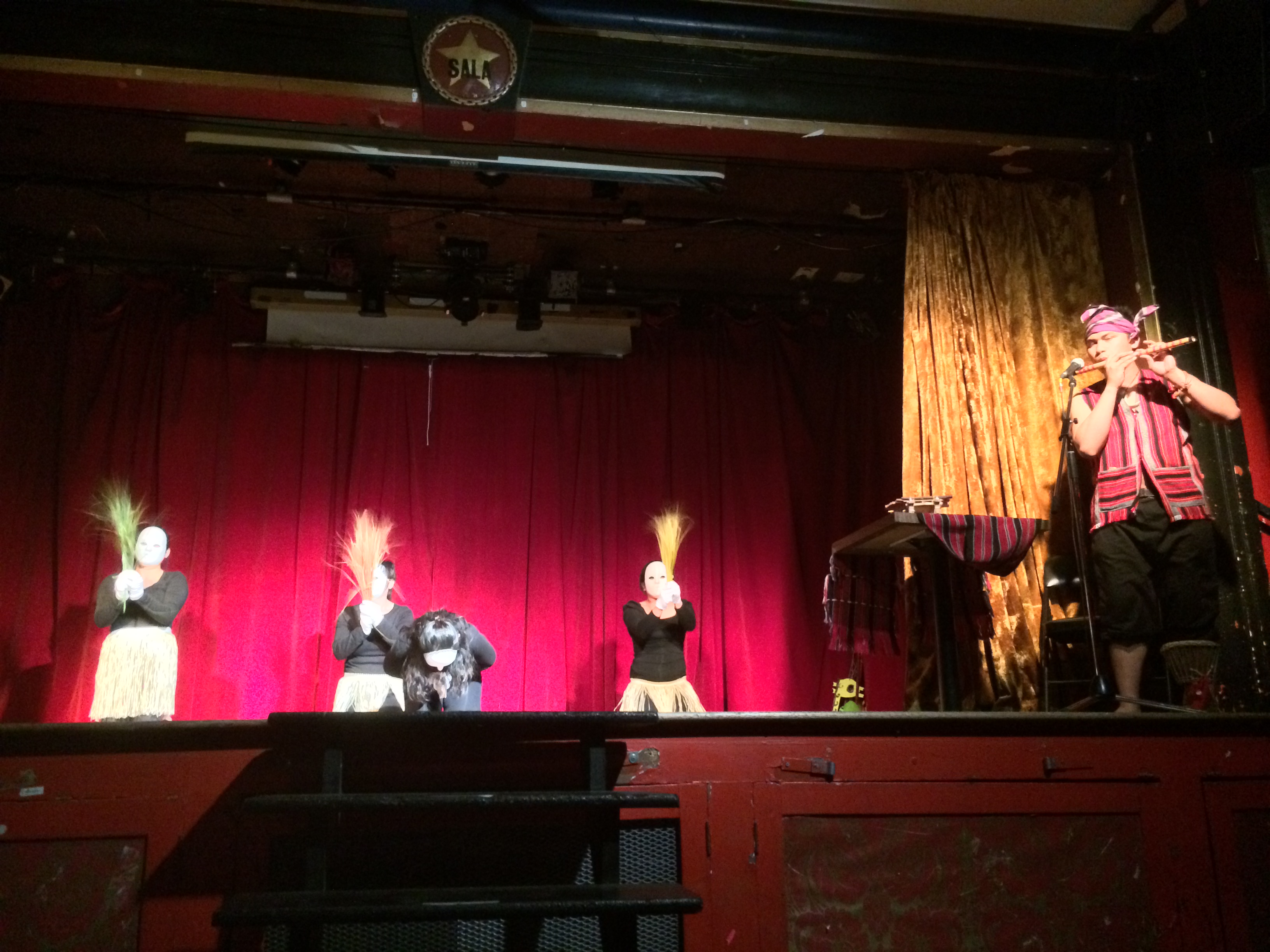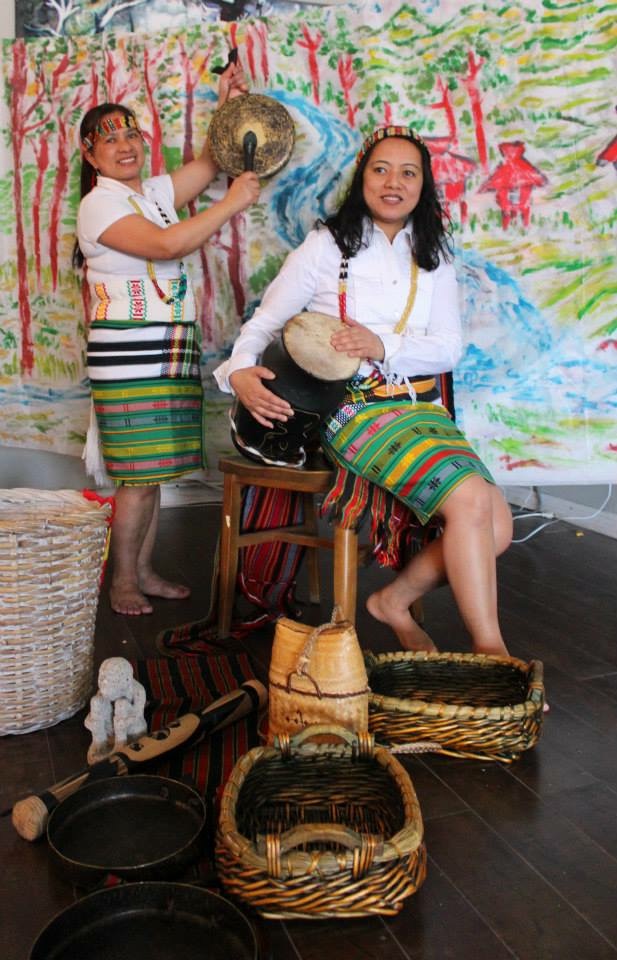
They came from the Cordillera region in northern Philippines. Their families were grabbed of their ancestral lands. Without their own houses to live at and farmlands to till, they moved to another country to work in order to help their families survive economically. They brought with them their tales, music, culture and arts to tell stories of their struggles for justice and self-determination of their community.
One of the stories most popularly portrayed by the Cordillera people is the bravery of Macliing Dulag, a respected elder and rice farmer who successfully led his community and the Cordillera ethnic people in opposing a dam project along Chico River during the Marcos regime in the 1970s. The project would have inundated 1,400 sq. kms of rice fields, homes, communal forests and sacred burial grounds in Kalinga, one of the six provinces included in the Cordillera region. As many as 100,000 lives of people in the surrounding villages along the river would have been affected by the project.
Macliing Dulag became a strong and articulate leader who stayed firm in opposing the construction of the dam. He and other ethnic Kalinga and Bontoc communities argued that national development should never be achieved at such extreme sacrifice. Resistance to the hydroelectric dam project helped unify what was once a divided Cordillera region. Macliing Dulag and other Cordillera leaders initiated a series of tribal pacts, which helped cement this unity and create a very broad anti‑dam front. Macliing Dulag became the recognized spokesperson for the anti-dam opposition.

However, Macliing Dulag was assassinated on April 24, 1980 when a group of government soldiers raided his house and killed him with a rain of bullets. His assassination, however, solidified the opposition to the dam, which had won sympathizers from all over the country and even outside the country. The World Bank, which would have funded the dam construction, withdrew from the project, forcing the government to back out of it in the end.
The Cordillera indigenous people are inhabitants in the Cordillera mountain range, which covers six provinces in northern Philippines – Abra, Apayao, Benguet, Ifugao, Kalinga, and Mountain Province. They are collectively called Igorots, meaning “mountain people.” The Cordillerans are known for their fierce resistance to government abuse and private investors who steal their ancestral land for private profits.
Agnes Calgo, president of The Filipino Indigenous People Organization in Quebec (FIPOQ) recalled, “As a member of the Ibaloi tribe of Benguet, I remember my ancestral land that I grew up in as a child. It was the land that we as a people have cultivated and taken care of for many generations. As a mountain people, our special farming techniques are well known in the world and have sculpted the landscape of the Cordilleras. During my childhood years, our people, along with my family were displaced from our ancestral lands by the government when they decided to build a hydro-electric dam flooding the municipalities of Bokod and Kabayan.”
Founded in 2013 in Montreal, FIPOQ’s mission is to promote culture and advance the rights for ancestral domain through building solidarity with all indigenous people in the Philippines and around the world. It was first called Cordillera People Support Group but then changed its name to FIPOQ in 2015.

In a speech during the International Women’s Day celebration in Montreal in March 2015, Agnes recounted how the circumstances pushed indigenous people like her and other FIPOQ members to migrate to another country. “We were relocated in what the government called “public” land, in a remote area far from village to market roads, undeveloped, and a mostly harsh mountainous and forested area. It took generations for our people to cultivate our ancestral domain, to make it livable and sustainable for the needs of our people. To simply dump us in this new area and expecting us to survive on our own was not a viable solution. Our people could not survive this way. We were uprooted from our ancestral domain and forced to deal in a westernized “modern” economy. It was no longer enough to simply cultivate the land and grow food, we had to sell the produce in town in order to get money to be able to buy and pay for other things that we have become dependent on. In this relocated area we could not flourish or eke out a living for our families,”
“And so it was my parents decision to move our family to the big city to work as tenant farmers on lands owned by rich land owners. My parents tried to set up a small business that could earn us some income and put us through school. After college, I was then forced to leave the Philippines to make a living abroad as a migrant worker in Canada,” Agnes lamented.
During the celebration of the Cordillera Day in Montreal last April, FIPOQ’s narrative presentation illustrated how development aggression, such as extensive logging, large hydro-electric dam projects and large scale mining, have begun to degrade the environment that resulted in flash floods, mudslides and destruction of forests, mountains, rivers and lakes in the Cordillera for decades.
The Philippines is the fifth most resource rich country in the world when it comes to mineral resources. Much of the mineral deposits are found in the ancestral domains of indigenous peoples that are situated in mineral-rich mountainous terrains. In the areas where mine tailing spills have occurred, women and children have been the most affected in terms of health. Skin diseases and cancer incidences have been on the rise as people ingest the heavy metals that are poured into the water sources of the communities.

FIPOQ’s presentation criticized the large-scale foreign mining and plantation corporations that have displaced people and had pushed indigenous people out of their ancestral domains. The group also showed how the military participated in this onslaught against indigenous communities. The military has forcibly relocated tens of thousands of indigenous peoples, comprising entire indigenous communities, in an attempt to counteract the growing resistance in the upland areas.
Through playing traditional instruments, dance, costumes and visual arts, FIPOQ demonstrate in their presentations why it is important for them to preserve their traditional, cultural and religious practices; as well as having a special relationship with their ancestral lands. For the indigenous people, their concept of land is that it was granted and entrusted by one Creator for everyone to harness, cultivate, sustain, and live on. It adheres to the spirit of collectivism and rejects the idea of private property.
Dr. Chandhu Claver, spokesperson of the Cordillera Peoples Alliance (CPA) in Canada, explained that popular resistance inspired the formation of a militant mass movement for the defense of ancestral land and self-determination within the framework of wider national democratic struggle. Since 1984, CPA has distinguished itself at the forefront of the struggle for indigenous people’s rights through its various militant campaigns. April 24, the date of the death of Macliing Dulag was set as Cordillera Day to commemorate the broadening of the Cordillera mass movement to symbolize the widening unity and solidarity amongst the different indigenous peoples of the Cordillera. The first celebration of Cordillera Day was held in Sagada, Mountain Province in 1985.
And since then, Cordillera day is being celebrated in many cities around the world. With their families being displaced in their own lands, and driven by inadequacy in economic opportunities, many indigenous people have become part of the diaspora. Nevertheless, the fighting spirit of the Cordillerans never ceases regardless of which city they move to.
Since 2012, FIPOQ organizes the Cordillera day celebration in Montreal every April of each year. They also participate in celebrations of other Cordilleran groups in Ontario to strengthen solidarity work.
FIPOQ members also belong to other progressive Filipino groups in Montreal such as PINAY (a Filipino women organization), Anakbayan (a Filipino youth organization), and the Filipino Parents Support Group. FIPOQ has also presented theatre performance for other advocacy issues, such as about migration, health insurance for domestic workers, colonialism, etc.
FIPOQ hosts events whenever there are progressive community leaders from the Cordillera visiting Montreal so that they can discuss and exchange insights about the issues in Cordillera.
As part of their arts and advocacy activities, FIPOQ has participated in various events such as the Filipinos migrants’ assembly, the Montreal International Anarchist Theatre Festival and Filipino community Christmas parties. FIPOQ also joins in the Nuestro Americana Friendship Parade, wherein they get to meet other indigenous groups from all over Quebec in a festivity. FIPOQ has also established a linkage with the First Nations in Wenawac, a reserved community for indigenous people in Quebec, for cultural exchange.
Jayson Palolan, a FIPOQ member whose paintings were mostly about indigenous people and the Cordilleras, said that visual arts are central to their identity and is an expression of a unique and enduring tradition. Thus, the visual arts have an important place in the continuing survival of indigenous people and their culture. Jayson has displayed his paintings and artworks in various events where they perform.
FIPOQ is an affiliate organization of the Cordillera People’s Alliance, which is a Philippine-based umbrella organization of many Cordillera indigenous peoples groups in the Philippines and those based in other countries. FIPOQ has joined other campaigns and has expressed their militant positions through various means and forms such as petition-signing, dialogues, community meetings, mobilizations and marches. FIPOQ also actively participates in various forums to criticize the presence and oppressive practices of Canadian mining companies that are located all over the Philippines. To deepen their understanding about development issues, FIPOQ organizes educational discussion among its members to further advance critical thinking that they can use when developing storylines for their presentations. In all of their presentations, FIPOQ has displayed a variety of social organization, cultural expression and artistic skills with a high degree of creativity.
FIPOQ hopes to expand their membership by encouraging other Filipino migrants in Montreal of indigenous origin and to develop more linkages with other support groups in Canada to reinforce solidarity in order to defy issues of aggressions among indigenous communities in the Philippines.
The continuing struggles of the indigenous people in the Philippines need strong international solidarity. According to the report of Kalipunan ng mga Katutubong Mamamayan ng Pilipinas (KAMP or the Alliance of Indigenous People in the Philippines), more than 100,000 indigenous people from 39 tribal groups all over the country will be dislocated or will lose their livelihood as an effect of the all-out mining liberalization under the current government of President Aquino. Indigenous leaders from mining-affected communities had submitted a petition to lawmakers calling for the repeal of the Mining Act of 1995 which opened the floodgates for mining projects in ancestral lands. (Bulatlat.com, August 9, 2014)
Away from home does not mean that migrant indigenous people would disconnect from the struggles in their homeland. The stories of Macliing Dulag and other Cordilleran martyrs who successfully fought the destructive projects in the ancestral lands will continue to give passion and inspiration to the indigenous people to continue their resistance.